350
Activist Stories
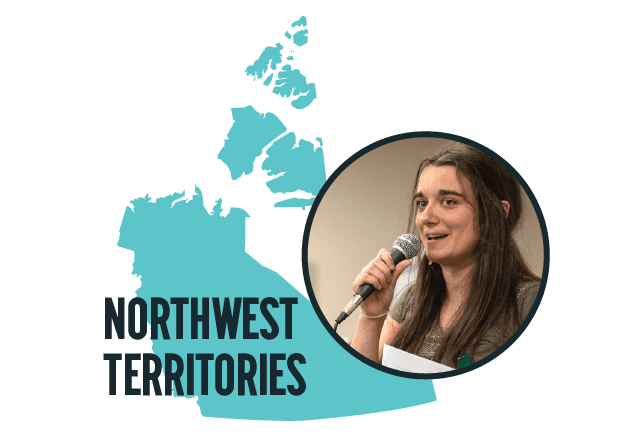
Ellen Gillies
Ellen Gillies is a community organizer based in Yellowknife, Northwest Territories, on unceded, sovereign Yellowknives Dene and North Slave Métis territory. Ellen has been a steadfast advocate for a Green New Deal in Canada, both at the national and territorial levels.
While Ellen got her start in climate organizing during her time as a student in Montreal with the divestment movement, her connection with our staff team in Canada grew through the Our Time campaign in 2019, a campaign to put climate at the center of the 2019 federal election and to build a powerful youth force to elect Green New Deal champions into government.
When the Canada team launched the campaign, Ellen raised her hand to be a local leader in the northern community of Yellowknife. Over the course of that campaign, she inspired people around her, pulled together and tended to a multi-generational team of organizers, and built political power and grassroots vision of a Green New Deal in the North.
After the election (and some rest!), Ellen and her team turned their attention to their territorial government in early 2020. It couldn’t have come at a more urgent time: at the onset of the COVID-19 pandemic. Ellen and the Our Time Yellowknife team launched the Just Recovery – NWT campaign in early 2020, built around six demands: workers’ rights, a guaranteed liveable income, housing, internet, mental health & addictions services, and a Green New Deal.
Ellen and her team have put forward a vision that connects racial justice, class struggle and Indigenous sovereignty with climate justice in their local context. This intersectional approach doesn’t come about by accident, but in fact, is seeded and tended to by thoughtful organizers like Ellen.
In Ellen’s own words, she notes “the pandemic has shown how rapidly governments can actually get [work] done when they want to, whether it’s by making the internet unlimited, banning evictions, or topping up low-wage workers’ pay.”
We’re eager to continue to see the fruit of Ellen’s Green New Deal organizing in the North.
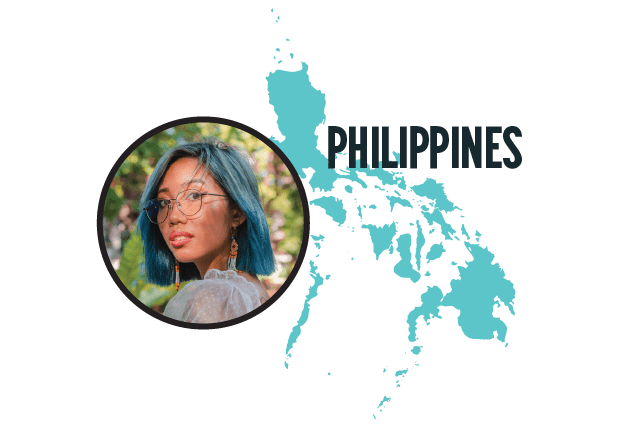
Mitzi Jonelle Tan
Mitzi Jonelle Tan is a climate justice activist based in Metro Manila, Philippines. She is the convenor and international spokesperson of Youth Advocates for Climate Action Philippines (YACAP), the Fridays For Future (FFF) of the Philippines. She is also active in FFF International, advocating for climate justice and making sure that voices of Most Affected Peoples and Areas (MAPA)’s strikers are heard, amplified, and given space.
She first became an activist in 2017 after collaborating with Indigenous leaders in her country which pushed her to realize that collective action and system change is what we need for a just and greener society.
350 – along with other organizations – has been working with Mitzi and other MAPA youth in raising their voices in international media, social media, supporting Global Climate Strike days of action and the recent campaign launched by Fridays for Future calling on Standard Chartered Bank to Decarbonize.
Mitzi said “In a world where the youth must take on the huge task of leading the way to a just and sustainable future, we need adults supporting us as we tackle systems of oppression and injustice. And 350.org has done exactly that, offering support and empowering us with tools and strategies needed.”
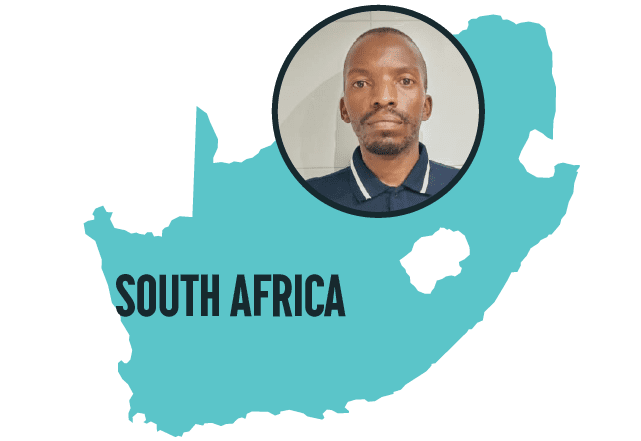
Nkanyiso
Meet Nkanyiso, an activist well known in his community in a town called Newcastle, Kwa-Zulu-Natal. He is a campaigner at heart and is one of the organisers for the community group Newcastle Environmental Justice Alliance (NEJA). Nkanyiso is passionate about “environmental justice and climate justice for sustainable development and ecological purity.”
350Africa had the honor of working with Nkanyiso when he received an invitation from Tshepo Peele from the 350Africa team. At the time he was part of the National Gasdown Frackdown Gathering in Durban which was organised by South Durban Community Environmental Alliance and GroundWork. Thus, an incredible partnership was formed and Nkanyiso later attended the AfrikaVuka induction training.
Through Nkanyiso’s leadership, the campaign against coal extraction has reached significant milestones like meeting with the Department of Minerals and Resources, something that hasn’t been done before given the community’s reliance on coal. Through this particular campaign he has also been able to engage a lot of youth participation. Tshepo Peele 350Africa.org South Africa Field Organizer and Campaigner, is impressed with Nkanyiso’s vocal nature in the climate movement in South Africa. “He ensures that his voice and the organisation’s voice are heard by the targeted government institutions.”
Nkanyiso’ is currently working to shut down coal mines and rehabilitate old closed coal mines to become spaces for community usage.
We at 350Africa are very grateful for Nkanyiso’s contribution to the climate movement. A good reminder that the world needs more vocal activists to uplift and empower their communities. The power lies with the people and this is evident enough in this strong leadership.
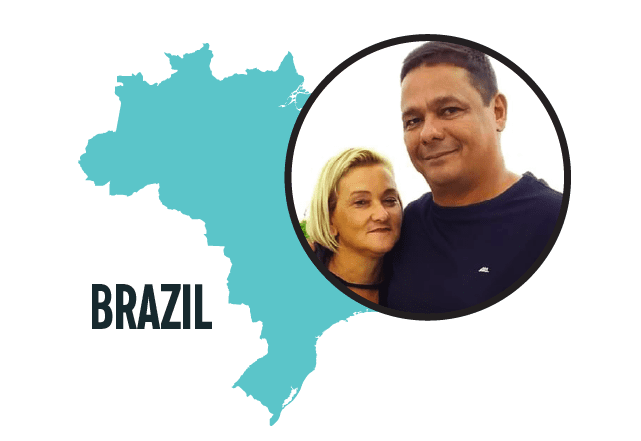
Alexandre Anderson De Souza And Daize Menezes De Souza
Alexandre Anderson De Souza And Daize Menezes De Souza
Alexandre Anderson de Souza and Daize Menezes de Souza, husband and wife, are artisanal fishers and community leaders in Rio de Janeiro, Brazil. They have been working for more than two decades to denounce and stop oil leaks and attacks to the fishers’ communities in the Guanabara Bay, one of the most densely populated areas of the Brazilian territory.
Both are amongst the most active members of Ahomar (Association of Men and Women of the Sea from the Guanabara Bay), a grassroots organization which coordinates actions such as boat expeditions to track and register oil leaks in the sea caused by refineries, shipyards, pipelines and huge oil boats.
Ahomar was created in response to the worst spill ever registered in the region, in 2000, when a pipeline from Reduc (Refinery Duque de Caxias, linked to the Brazilian huge oil company Petrobras) suffered a major rupture and leaked about 1.3 million liters (more than 285,000 gallons) of fuel oil directly into the waters of the Guanabara Bay. The stain of pollution in the marine waters spread throughout 40 km2 (more than 15 square miles), destroyed mangroves that were key to the biodiversity and fishing activity in the region and contaminated the Guapimirim Environmental Protected Area, a pristine conservation area.
Deeply affected by this historical environmental disaster, fishers from the area joined to demand financial compensation for the damages to their livelihood and stricter control of the fossil fuel industry activity in the bay. Hundreds of them received some reparation since then, but it has not been nearly enough to make it up for the losses they suffered, not to mention the irreparable harm to those ecosystems.
“We see the effects of that spill up to today. The amount of fish and seafood we catch has never been the same, and we still find oil in the mangroves, although it is hard to know if it is the remainder of the huge spill or from all the smaller leaks we have registered since then”, said Alexandre.
In fact, since 2000, Ahomar has registered dozens of small leaks along the pipeline or even intentional oil discharges from the ships that are constantly crossing the bay. In 2018, 350 activists helped Ahomar register one of these leaks and pitch the images to a leading TV news program in the country. Members of Ahomar frequently deliver new photos and videos of illegal practices and accidents to a group of federal prosecutors that has been working to make the fossil fuel companies accountable for their misconducts, not always successfully.
Besides the hard job of keeping track of the environmental and social effects of the oil and gas sectors, the fishers’ community faces violence and threats against them. A few members of Ahomar have been murdered in the past few years, including Alexandre’s brother, Anísio, in unclear circumstances. Alexandre and Daize themselves have received several death threats by anonymous calls and letters, which led the Brazilian government to provide bodyguards for the couple, as part of a federal program for protection of community defenders under risk.
Still, this couple continues to mobilize and inspire fishermen and fisherwomen in their fight to demand respect for their rights and for the environment, and not only in the Guanabara Bay. In December 2020, they joined for the third time a protest organized by 350.org in front of the luxury hotel in Rio de Janeiro where the Brazilian Oil and Gas Agency (ANP) was holding an auction to offer to companies the right to explore for oil and gas reserves in several regions, including other coastal areas and a portion of the Amazon forest.
“We know how damaging the fossil fuel industry can be to the communities, especially to the women who depend on a clean environment to feed their family, so we showed up to offer our solidarity and stand for those who will be affected by these auctions in the Amazon and in other parts of Brazil”, said Daize in the day of the auction.
350 and Ahomar are planning new actions to draw the attention of the media, the politicians and the public to the urgent need for an energy transition and Just Recovery. To the fishers of the Guanabara Bay, environmental justice is not only a concept, but a very concrete demand.
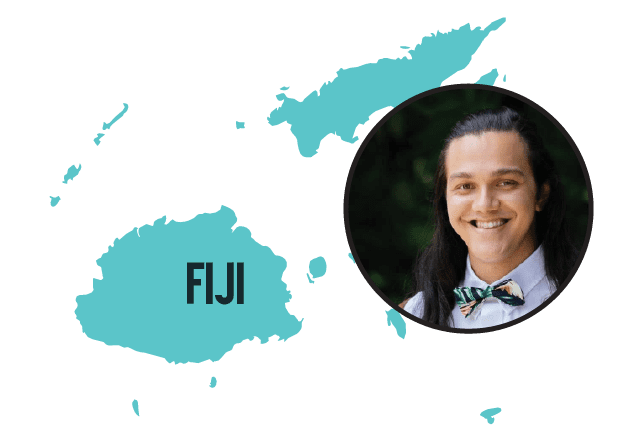
Ernest Gibson
Ernest Gibson is a 350 Pacific Climate Warrior based in Fiji. After joining 350.org’s Pacific Pawa Up Fellowship, he now sits on the seven-member United Nations Secretary General (UNSG) Youth Advisory Group on Climate Change as the only Pacific Island representative and has dedicated his life to climate, public health and advocacy.
As a volunteer coordinator for 350 Fiji, he balances his advocacy mission along with a full-time job at the World Health Organization, school, and family.
“I joined the climate movement out of necessity. I know that there are people a stone’s throw away from me that have had their lives absolutely upended due to the injustices and inequalities that have led to the climate crisis. We need to move away from looking at the climate crisis as an environmental issue – it is an ethical issue, it is a human rights issue, it is an economic issue, it is about peace and security. Whether we like it or not, all these things are connected. And the solutions lie in our ability to take charge of this capitalist, greed-driven system and fundamentally change the world we inhabit,” shared Ernest.
Ernest joined the Pacific Pawa Up Fellowship because he felt like the Pacific Islands have always been treated like a supporting character and often are thought of as passive recipients, and not as the active agency-holders Pacific people are. The Fellowship was a space where he met like-minded people who looked, talked and thought like him! It reinforced the notion that climate justice is centered around people – whether it was problems such as marginalization that people introduced, or solutions that people could bring.
On the UNSG Youth Advisory Board, he works closely with various teams, providing advice sought in consultation with communities, connecting youth to a high-level policy decision-maker. When asked how the Fellowship contributed to his work on the advisory board, Ernest responded: “Climate discussions, especially in this political climate (pun intended) are so nuanced and often difficult to navigate and the Pacific Pawa Up fellowship was an opportunity to prepare me to have these tough conversations.”
His proudest climate justice moment? Sitting at the foot of his bed – that’s where the internet worked best – with his phone plugged in, in the middle of the COVID-19 pandemic, while talking to 2,000 young people across Asia and Pacific about the importance of evaluating and establishing mutual relationships, especially the value of youth, in climate discussions.
Joseph Sikulu, 350 Pacific Interim Managing Director shared, “Ernest has exemplified the very best of Pacific youth — a resilient, strong, innovative and passionate leader working hard for climate justice. As Pacific Climate Warriors, we are so honoured to be part of Ernest’s journey and to see how our work has empowered him to influence thinking and decision making on the global level.”
He credits his family, whom he leans on for support when the going gets tough and his duties get overwhelming. But he says, “350 Fiji always pulls through, and this togetherness and teamwork is what I’m grateful for.”
We’re grateful for climate leaders like Ernest, who work tirelessly for a just recovery for Pacific Islanders and other frontline communities.
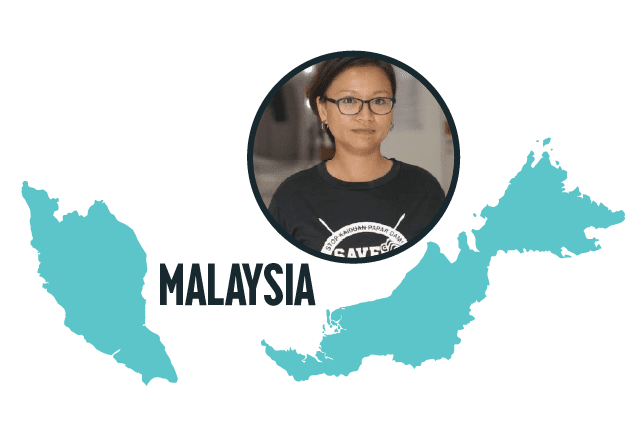
Ili Nadiah Dzulfakar
Ili Nadiah is a climate feminist who co-founded Klima Action Malaysia – KAMY, a youth-led movement working on building constituencies of vulnerable groups of youth, women, and indigenous communities towards active participation in climate justice. She is an Advisor at Stockholm International Peace Research Institute (SIPRI) for Environment of Peace; a framework of environmental and climate crisis in peace and security, and Climate Tracker research fellow. She is also a campaigner at the Asia Climate Rally and the Southeast Asia Climate Alliance.
What led you to become a climate activist?
Before I was a climate activist, I was a community organizer, from women’s issues to indigenous rights. When I started studying environmental science, I began learning about climate science, but my Weltanschauung (worldview) changed the moment I began to link all these different aspects of the climate crisis and my experience, from climate science, gender inequality to environmental racism. I think this is where and how I am grounded on climate activism. Most importantly, the Indigenous philosophy of creation and balance inspires me to be where I am today.
Where do you draw your hope and strength?
I draw hope and strength from the women around me, where the support and love have healed the pessimism I felt about climate action.
How do you rest and make time for caring for yourself and your community?
We run community calls every week to CHILL, to listen to each other’s views and thoughts. This safe space is where we build and reconnect especially during this pandemic when physical activity is limited.
We take inspiration from youth activists like Nadiah whose roots in organizing alongside communities, indigenous groups, youth and women remind us how crucial the intersectional approach is to our work.